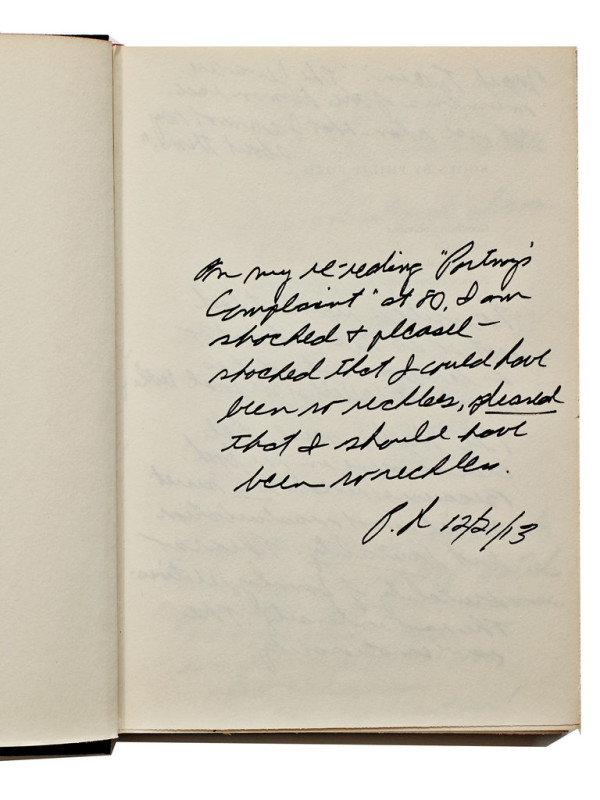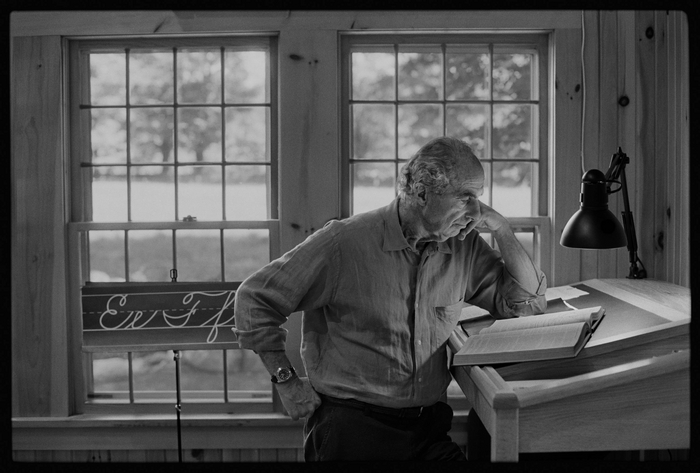Q: Looking back, how do you recall your 50-plus years as a writer?
Roth: Exhilaration and groaning. Frustration and freedom. Inspiration and uncertainty. Abundance and emptiness. Blazing forth and muddling through. The day-by-day repertoire of oscillating dualities that any talent withstands — and tremendous solitude, too. And the silence: 50 years in a room silent as the bottom of a pool, eking out, when all went well, my minimum daily allowance of usable prose.
Philip Roth
Reckless
A note by Philip Roth, written in a first edition of Portnoy’s Complaint, which he recently reread after 45 years.
Miserable people
Writers are very often miserable people: some thrive on unhappiness, others don’t. But few are immune from feelings of deep and avid dissatisfaction. We write because we are constantly discontented with almost everything, and need to use words to rearrange it, all of it, and set the record straight.
Avi Steinberg, “Is Writing Torture?”
Writing is frustration
I know I’m not going to write as well as I used to. I no longer have the stamina to endure the frustration. Writing is frustration — it’s daily frustration, not to mention humiliation. It’s just like baseball: you fail two-thirds of the time. I can’t face any more days when I write five pages and throw them away. I can’t do that anymore.
Roth: Stop now
Then Roth, who, the world would learn sixteen days later, was retiring from writing, said, in an even tone, with seeming sincerity, “Yeah, this is great. But I would quit while you’re ahead. Really, it’s an awful field. Just torture. Awful. You write and write, and you have to throw almost all of it away because it’s not any good. I would say just stop now. You don’t want to do this to yourself. That’s my advice to you.”
I managed, “It’s too late, sir. There’s no turning back. I’m in.”
Nodding slowly, he said to me, “Well then, good luck.”
Julian Tepper, “In Which Philip Roth Gave Me Life Advice”
Philip Roth interviewed on “Fresh Air”
TERRY GROSS: So if [writing] is so hard, why do it?
PHILIP ROTH: Well, that’s a question I ask myself too. I’ve been doing it since 1955. So that’s 55 years. It’s hard to give up something you’ve been doing for 55 years, which has been at the center of your life, where you spend six, eight, sometimes ten hours a day. And I always have worked every day, and I’m kind of a maniac, you know. How could a maniac give up what he does? Tell me.
GROSS: Is that seven days a week, like Saturday and Sunday?
ROTH: Yeah, I usually do, yeah.
GROSS: That is obsessive.
ROTH: Maniacal.
GROSS: Maniacal?
ROTH: Give it its right name. It’s maniacal.
Via nprfreshair
Roth: “The ordeal is part of the commitment”
“I have a slogan I use when I get anxious writing, which happens quite a bit: ‘the ordeal is part of the commitment.’ It’s one of my mantras. It makes a lot of things doable.”
Portrait: Philip Roth
Philip Roth at his home in rural Connecticut, 2004. (Via.) Photo by James Nachtwey. More about Roth’s work habits here.

